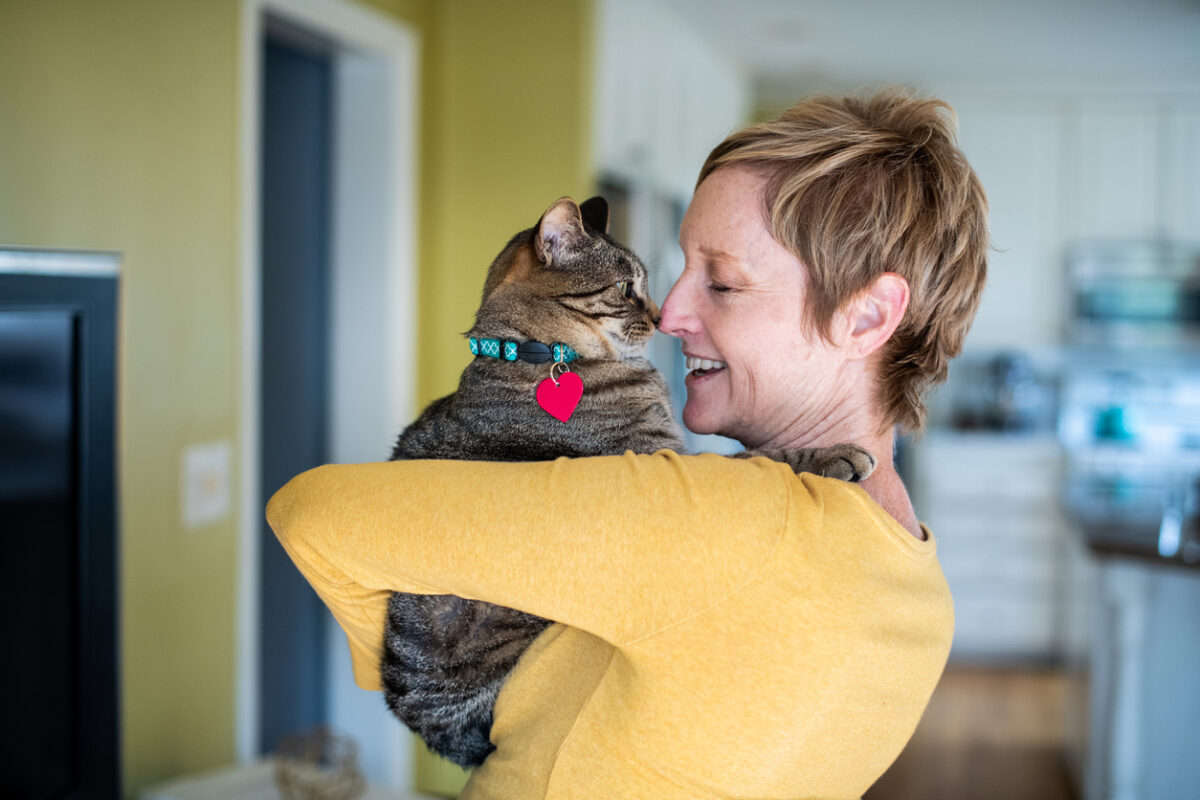When our children leave home, it can leave many parents feeling a sense of grief and a loss of purpose. For some empty nesters, that can translate into fatigue, difficulty sleeping, and depression. Many people choose to get a pet during this time in their lives to assuage their loneliness and grief.
For many of those in the process of becoming empty nesters, sharing their home and life with an animal companion is of tremendous benefit. For some individuals, pet ownership brings with it unexpected responsibilities and inconveniences that end up being more than bargained for.
Adopting a pet is typically a 10-20 year commitment. It’s worth the time to do the research and soul-searching to be certain of your choice.
Pros and Cons of Pets for Empty Nesters

Pro: Better physical and mental health
According to the CDC, adding a pet to the household has many health benefits, both physical and mental. Physically, the health benefits of caring for a pet include decreased blood pressure and cholesterol with an overall increased fitness. On the mental health front, pets can help us better manage stress, decrease loneliness, and increase our overall happiness.
Con: Health risks
While having a pet is generally beneficial for your health, there are exceptions. Unruly animals can cause injury, even without intending to, and some illnesses are zoonotic, meaning that they can jump from one species to another. Domestic animals can even harbor a few zoonotic illnesses while showing no symptoms. While these hidden diseases often have mild or no symptoms for healthy adults, they can be problematic for vulnerable individuals: children, senior citizens, and those who are immunocompromised.
Pro: Keeping a routine

As parents, much of our daily schedules often revolve around our children’s schedules. When they leave home, schedules suffer, especially for single and stay-at-home parents. The regular feeding, grooming, training, and exercise required to properly take care of a pet can provide a sense of routine for both parties. It also helps to provide a sense of purpose for the empty nester, ensuring that their companion is well cared for.
Con: Making travel tricky
One of the benefits of being an empty nester is the option to travel without worrying about the kids. When you bring an animal companion into your life, you will need to account for their needs as well if you decide to take a trip. Whether that involves bringing your pet along, boarding them at a kennel, or having a pet sitter care for them in your home, it’s an extra step and an additional cost.
Pro: Improved social interactions
Making friends as an adult can be a challenge, and social groups sometimes shift during big life transitions. Having a pet can help you meet new people through training classes, forums, or group activities. For many individuals, pets also help manage social anxiety. Just their pet’s presence can be enough to calm an anxious owner, and pet parents always have a pet-related story or two to tell.
Con: The financial cost
Buying a well-bred dog can range from a few hundred dollars and a few thousand, and the cost for getting a pet from a shelter or rescue group ranges somewhere between $50-300. After licensing and vet bills, the free pet you get off of Craigslist isn’t free either. Once you have your new pet at home, there are costs for feeding, vet care, training, toys, and more. Raising a pet isn’t as expensive as raising a child, but it definitely can take a bite out of your disposable income.
Picking the right pet for your empty nest

Many of the cons of pet ownership can be mitigated by choosing the correct pet for your situation. Here are a few things to consider when selecting the best pet to fill your empty nest.
Lifespan
Becoming a pet parent to a dog or cat is usually a 10-20-year commitment, but there is some variability within that range. If you are looking for a longer-lived pet, a cat or smaller dog breed may be a better choice than a large or giant breed dog.
Space issues
It’s difficult to raise a Great Dane or Saint Bernard in a small apartment, but it takes more attention to ensure that a small dog stays safe from harm. Even cats need a private spot for their litter box. Before bringing home your new companion, you will need to decide where they will fit physically into your household.
Time commitment and training
A puppy that requires extensive training and socialization may be a poor choice for the empty nester with a busy life outside the home, whereas a cat or an independent dog breed like a Miniature Schnauzer or Akita may fare better. However, if you spend a great deal of time at home alone, that puppy’s playfulness may be exactly what you need to keep you energized and happy.
Extra housework
Cats, with the exception of a few fairly expensive breeds, such as the Sphynx, Cornish Rex, and Devon Rex, shed. While there are also a number of non-shedding dog breeds, such as Poodles, Irish Water Spaniels, and several breeds of terrier, some breeds, Malamutes, Chows, German Shepherds, and many others, shed excessively. If you happen to have a super-shedder, it does mean a little more work in the vacuuming department, but if you’re feeling crafty, you can always spin it into yarn!
Friendliness with others
If you want an animal to keep you company at home and don’t have frequent visitors, it may not be essential that your pet be outgoing or friendly with other people as long as it isn’t dangerous or aggressive. Those looking for a companion both at home and out and about should choose an animal with a friendly, outgoing attitude. If you frequently have guests over, cats and well-behaved dogs of all sorts can still be delightful companions when socialized early and often.
Conclusion
For empty-nesters, pets can be a welcome distraction from the slightly too quiet house. They can help reduce feelings of loneliness, give you a renewed sense of purpose, and introduce you to new people. While they are a gratifying and life-changing addition to many households, they don’t fit into every empty nester’s future plans. Hopefully, this breakdown of the pros and cons of pets helps you make the best decision for yourself.
Read Next:







